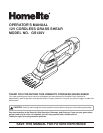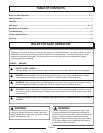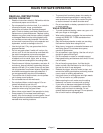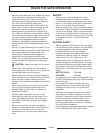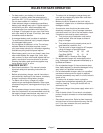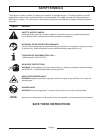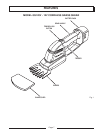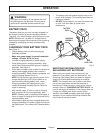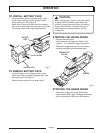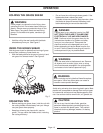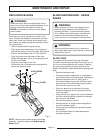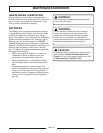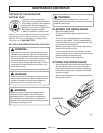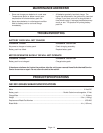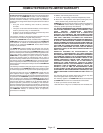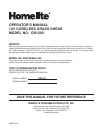
Page 5
RULES FOR SAFE OPERATION
• For best results, your battery unit should be
charged in a location where the temperature is
more than 50°F (10°C) but less than 100°F (38°C).
Do not store outside or in vehicles.
• Under extreme usage or temperature conditions,
battery pack leakage may occur. If liquid comes in
contact with your skin, wash immediately with
soap and water, then neutralize with lemon juice
or vinegar. If liquid gets into your eyes, flush them
with clean water for at least 10 minutes, then seek
immediate medical attention.
•A damaged battery pack is subject to explosion.
To avoid serious personal injury, properly dispose
of a damaged battery pack.
• Do not dispose of batteries in a fire. The cell may
explode. Batteries should be recycled, consult
your local waste authority for information regarding
available recycling and/or disposal options.
• When battery pack is not in use, keep it away from
other metal objects like: paper clips, coins, keys,
nails, screws, or other small metal objects that can
make a connection from one terminal to another.
Shorting the battery pack terminals together may
cause sparks, burns, or a fire.
CHARGER SAFETY
• Save these instructions. This manual contains
important safety and operating instructions for
charger.
• Before using battery charger, read all instructions
and cautionary markings in this manual, on battery
charger, and product using battery charger.
• To reduce risk of injury, charge only nickel-
cadmium type rechargeable batteries. Other types
of batteries may burst, causing personal injury and
damage.
• Do not expose charger to wet or damp conditions.
• Use of an attachment not recommended or sold by
the battery charger manufacturer may result in a
risk of fire, electric shock, or injury to persons.
• To reduce risk of damage to charger body and
cord, pull by charger plug rather than cord when
disconnecting charger.
• Make sure cord is located so that it will not be
stepped on, tripped over, or otherwise subjected to
damage or stress.
• An extension cord should not be used unless
absolutely necessary. Use of improper extension
cord could result in a risk of fire and electric shock.
If extension cord must be used, make sure:
a. That pins on plug of extension cord are the
same number, size and shape as those of
plug on charger.
b. That extension cord is properly wired and in
good electrical condition; and
c. That wire size is large enough for AC ampere
rating of charger as specified below:
Cord Length (Feet) 25' 50' 100'
Cord Size (AWG) 16 16 16
NOTE: AWG = American Wire Gage
• Do not operate charger with a damaged cord or
plug. If damaged, have replaced immediately by a
qualified serviceman.
• Do not operate charger if it has received a sharp
blow, been dropped, or otherwise damaged in any
way; take it to a qualified serviceman.
• Do not disassemble charger; take it to a qualified
serviceman when service or repair is required.
Incorrect reassembly may result in a risk of electric
shock or fire.
• To reduce risk of electric shock, unplug the
charger from outlet before attempting any mainte-
nance or cleaning. Turning off controls will not
reduce this risk.
• Disconnect charger from power supply when not in
use.
• Risk of electric shock. Do not touch uninsulated
portion of output connector or uninsulated battery
terminal.
• Save these instructions. Refer to them frequently
and use them to instruct others who may use this
unit. If you loan someone this unit, loan them
these instructions also.



